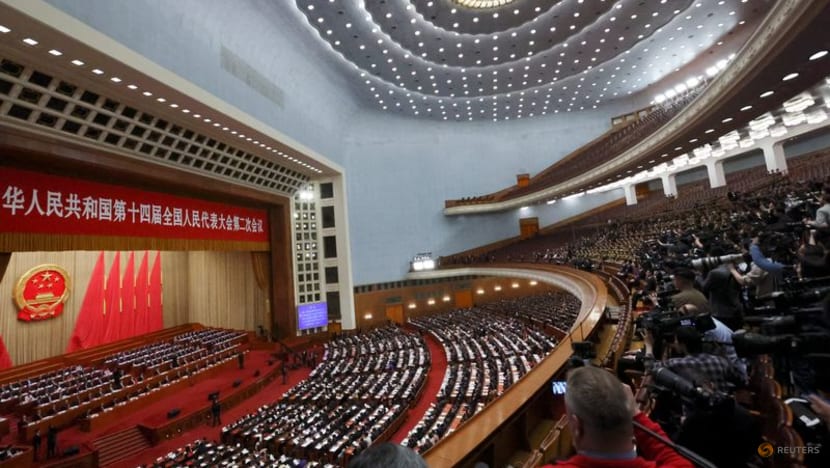Controversial clause on ‘hurting the feelings of the Chinese nation’ dropped from China's proposed security law
The initial proposed changes would have effectively barred speech, dressing and decorations in public places deemed “harmful to the spirit or the feelings of the Chinese nation”, with offenders facing up to 15 days in detention.

Chinese officials and delegates attend the closing session of the National People's Congress (NPC) at the Great Hall of the People in Beijing, on Mar 11, 2024. (File photo: Reuters/Florence Lo)

This audio is generated by an AI tool.
SINGAPORE: China has dropped a controversial clause in the latest draft of a public security law that would have punished anyone guilty of “hurting the feelings of the Chinese nation”, months after the proposal triggered backlash and concerns over potential abuse.
Released in September last year, the first draft of the Public Security Administration Punishments Law - which typically targets minor offences - had placed six acts in its crosshairs.
These included “wearing, displaying or decorating in public places, or forcing others to wear, display or decorate, clothing or symbols that are harmful to the spirit or the feelings of the Chinese nation”.
Offenders could face up to 15 days in detention and/or a maximum fine of 5,000 yuan (US$687).
The wording has been amended in the latest draft, which was submitted to China’s top legislature, the National People’s Congress (NPC), for a second review at its session late last month.
It now takes aim at clothing or symbols that “promote or glorify aggressive war or aggressive behaviour, causing a negative social impact”.
“DIFFICULT TO DEFINE”
The original phrasing was “subjective” and would make it “difficult to define its meaning in legislation and hard to grasp in law enforcement”, said Mr Shen Chunyao, deputy chairman of the NPC constitution and law committee, last week to the ruling Communist Party newspaper People’s Daily as quoted by South China Morning Post (SCMP).
“There is concern that law enforcement may infringe upon the legitimate rights and normal life of the public. Considering various factors and law enforcement needs, this draft revision will not use this expression anymore,” Mr Shen added.
The initial draft had sparked a public outcry over fears of potential abuse when made public in September 2023. Chinese legal experts also expressed concern that the amendments could be used arbitrarily, Reuters reported.
Mr Tong Zhiwei, a law professor in Shanghai, wrote on Weibo that month: "Who confirms the 'spirit of the Chinese nation' and according to what procedure? Who recognises the 'feelings of the Chinese nation' and according to what procedures?"
Mr Lao Dongyan, a professor of criminal law at Tsinghua University, said the proposed amendment “will create new space for corruption and may also intensify the conflict between the police and the public, posing new risks to social stability”, reported SCMP.
SCMP reported that a total of 93,975 people submitted 125,962 opinions on the first draft amendment during September.
WHAT’S IN A PHRASE?
“Hurting the feelings of the Chinese people” or “shang hai zhong guo ren min gan qing” is an expression commonly used by the Chinese state and ruling Chinese Communist Party (CCP).
Analysts believe the reference first emerged in 1959 in the pages of the CCP’s flagship People’s Daily newspaper, where it was used to rebuke India during a border dispute. Its use was only regularised after 1978, they note.
The phrase is a “common trope” in Chinese foreign policy discourse, wrote then-senior lecturer at Australian National University Amy King in a 2017 article published by US-based think tank Wilson Center.
The original text of the “hurt feelings” draft amendment diverges from the longstanding CCP phrase, in that it instead refers to individuals who “hurt the feelings of the Chinese nation”, or “shang hai zhong hua min zu gan qing”.
“The new phrasing … has been around for several years, but has appeared only in unofficial media sources rather than in the People’s Daily or other state-run outlets,” noted Mr Ryan Ho Kilpatrick from independent media outlet China Media Project in September 2023.
“Appearing for what might be the first time in an official legal text, the new phrase … suggests that violations are a civilizational affront to all people of Chinese ethnicity.”
In the wake of the latest changes, Mr Liu Sida, a law and sociology professor at the University of Hong Kong, told SCMP it was “truly heartening” to see the NPC seriously considering citizens’ opinions and opting to remove “vague and overly broad language” from the draft law.
A commentary published on Jun 21 by local news outlet The Paper said that “vague expressions” may cause ambiguity and misunderstanding once it enters serious legislation - especially public security legislation that could take away the citizen’s personal freedom.
“It is not to say that the public’s understanding of the simple ‘feelings of the Chinese people’ is controversial … different groups inevitably have different understandings of ‘hurt feelings’,” the piece stated.
The commentary also wrote that some self-published media have been “looking for trouble under the banner of ‘patriotism’”, while spreading rumours and extremist opinions, as well as defaming the image of companies.
Chinese nationalism came under the renewed spotlight earlier this year, after online attacks against Chinese drinks giant Nongfu Spring and Nobel Literature laureate Mo Yan.
Nongfu Spring was accused of using Japanese religious motifs on the packaging of its green tea products, while Mo Yan was accused of smearing national heroes and glorifying Japanese soldiers in his fictional works set during the Japanese invasion of China.
The campaigns against them raised eyebrows both in China and abroad, even drawing criticism from other nationalistic quarters within the country.















